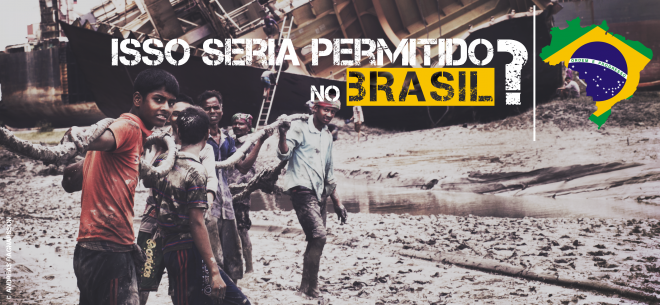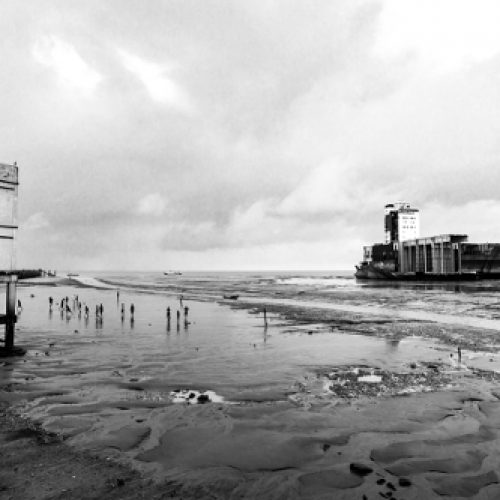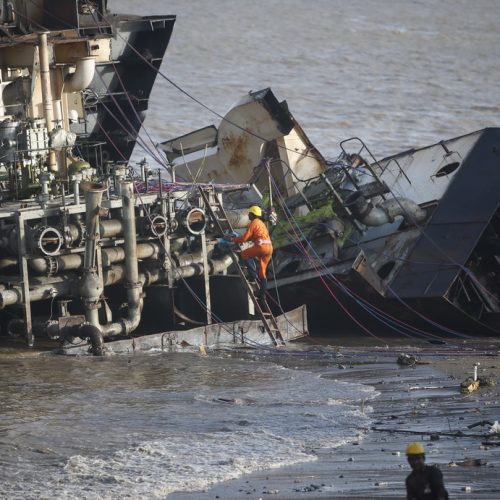Press Release – Brazilian government asked to stop dumping toxic ships on South Asian beaches
NGOs and trade unions criticize Petrobras’ end-of-life fleet management
The Brazilian CONTTMAF trade union federation and its member SINDMAR [1] have recently criticized the shipbreaking practices of Transpetro, the oil and gas transportation subsidiary of the Brazilian petroleum corporation Petrobras, majority-owned by the State. In the last five years, more than twenty vessels owned by the oil and gas giant have been dismantled on the beaches of India and Pakistan, where shipbreaking activities endanger both workers and the environment. In an official letter sent on 2 June 2017 to Transpetro, Severino Almeida, president of CONTTMAF and SINDMAR, expresses his serious concerns about the Petrobras’ poor end-of-life fleet management. Several of the ships that ended up in South Asia were built thanks to financing provided by the Merchant Marine Fund. In other words, public money has therefore been used to build ships that now put workers’ lives at risk and pollute the environment in developing countries.
According to maritime databases, at least six more units owned by Petrobras have already been sold for demolition but are still in Brazilian territorial waters. Four drill platforms were bought in a public auction by the cash-buyer Rota Shipping who exclusively delivers to Turkish yards and was able to offer just 180,000 USD more than Alfa Ship Trading, a cash-buyer who only sends to India. On the other hand, the product tanker LOBATO and the liquefied petroleum gas carrier GUAPORE have been sold by Petrobras to Indian breakers. The NGO Shipbreaking Platform has alerted Brazilian authorities about the imminent illegal exports under Basel Convention’s rules of these two vessels, currently located at Rio de Janeiro Anchorage. To date, no reply has been received.
As published recently by SINDMAR, and based on data collected by the Platform, Petrobras is not the only Brazilian company involved in dirty and dangerous scrapping practices. In the last two years, the Brazilian multinational corporation Vale, engaged in metals and mining, has also sold five ships to shipbreaking beaches in Bangladesh and Pakistan, where at least 79 workers were severely injured and 55 died in 2016. 35 year-old worker Mukhlesur was crushed to death as he and his co-workers were moving a large metal slab from the Vale’s ORE TIMBOPEBA at Mak Corporation Ship Breaking yard in Chittagong, Bangladesh.

A committee coordinated by the Ministry of Labour and Employment, with the presence of the Brazilian Navy and Petrobras itself, is now considering the possibility to include ship recycling in the scope of national regulation NR 34, which sets environmental and safety requirements for ship building and offshore constructions, including repair activities.


NOTE
[1] The Confederação Nacional dos Trabalhadores em Transportes Aquaviários e Aéreos, na Pesca e nos Portos (CONTTMAF) is a confederacy constituted for the purpose of coordenation, orientation, defense and legal representation of the professional categories in the maritime, riverine, lacustrine, diving, civil aviation, fishing and port activities. The Sindicato Nacional dos Oficiais da Marinha Mercante (SINDMAR), part of the confederacy, is the maritime officers’ union.
Related news

Platform News – Carnival Corporation commits to sustainable ship recycling
NGOs commend cruise shipping giant Carnival Corporation for its recent decision to support clean, safe and just ship recycling.
... Read More
Platform publishes South Asia Quarterly Update #31
Five workers suffered an accident on South Asian beaches in the third quarter of 2022.
... Read More
Press Release – European industry, trade unions and NGOs jointly support the EESC’s call for a financial incentive to enhance sustainable ship recycling
Today, the European Economic and Social Committee (EESC) adopted an own initiative opinion that calls on the European Commission to introduce an incentive that will “eliminate the… Read More

Press Release – Bangladesh: ship explosion exposes regulatory failures
Deadly accident in a yard with Hong Kong Convention certification claims six lives.
... Read More
Press Release – Platform publishes list of ships dismantled worldwide in 2016
Read our country-specific press releases: Brazil | Germany | Greece | Italy

Platform publishes South Asia Quarterly Update #19
There were a total of 193 ships broken in the second quarter of 2019. Of these, 146 ships were sold to the infamous scrapping beaches of South… Read More

Press Release – NGOs warn that Hong Kong Convention will fail to ensure sustainable ship recycling
Treaty to continue toxic business-as-usual on the Beaches of South Asia while undermining efforts for reform.
... Read More
Press Release – Local residents rally against shipbreaking operation in Union Bay, British Columbia
Local residents marched last Sunday at Union Bay to protest against the dirty and dangerous scrapping operations carried out in the area by Deep Water Recovery Ltd (DWR).
... Read More